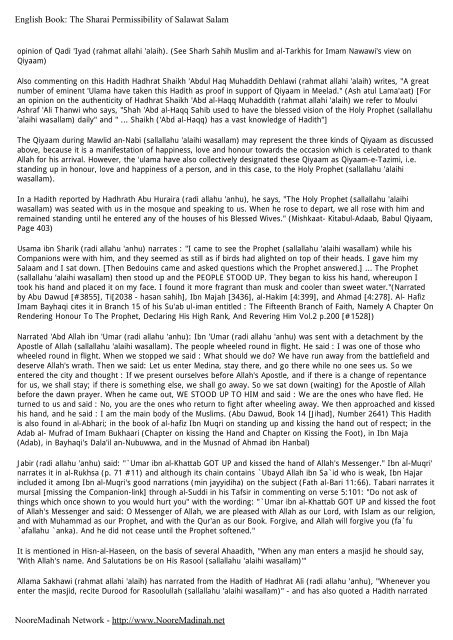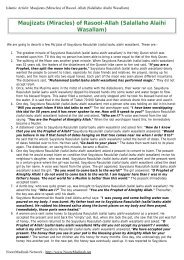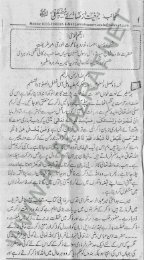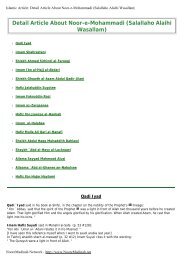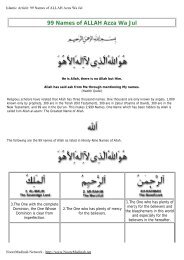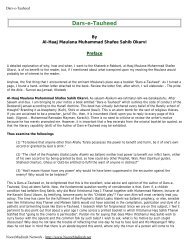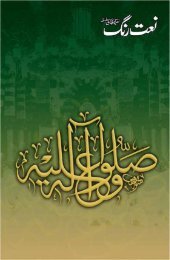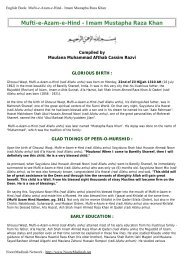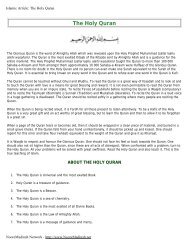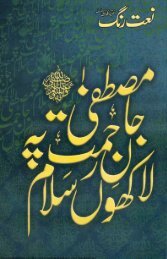The Sharai Permissibility of Salawat & Salam - Noore Madinah ...
The Sharai Permissibility of Salawat & Salam - Noore Madinah ...
The Sharai Permissibility of Salawat & Salam - Noore Madinah ...
You also want an ePaper? Increase the reach of your titles
YUMPU automatically turns print PDFs into web optimized ePapers that Google loves.
English Book: <strong>The</strong> <strong>Sharai</strong> <strong>Permissibility</strong> <strong>of</strong> <strong>Salawat</strong> <strong>Salam</strong><br />
opinion <strong>of</strong> Qadi 'Iyad (rahmat allahi 'alaih). (See Sharh Sahih Muslim and al-Tarkhis for Imam Nawawi's view on<br />
Qiyaam)<br />
Also commenting on this Hadith Hadhrat Shaikh 'Abdul Haq Muhaddith Dehlawi (rahmat allahi 'alaih) writes, "A great<br />
number <strong>of</strong> eminent 'Ulama have taken this Hadith as pro<strong>of</strong> in support <strong>of</strong> Qiyaam in Meelad." (Ash atul Lama'aat) [For<br />
an opinion on the authenticity <strong>of</strong> Hadhrat Shaikh 'Abd al-Haqq Muhaddith (rahmat allahi 'alaih) we refer to Moulvi<br />
Ashraf 'Ali Thanwi who says, "Shah 'Abd al-Haqq Sahib used to have the blessed vision <strong>of</strong> the Holy Prophet (sallallahu<br />
'alaihi wasallam) daily" and " ... Shaikh ('Abd al-Haqq) has a vast knowledge <strong>of</strong> Hadith"]<br />
<strong>The</strong> Qiyaam during Mawlid an-Nabi (sallallahu 'alaihi wasallam) may represent the three kinds <strong>of</strong> Qiyaam as discussed<br />
above, because it is a manifestation <strong>of</strong> happiness, love and honour towards the occasion which is celebrated to thank<br />
Allah for his arrival. However, the 'ulama have also collectively designated these Qiyaam as Qiyaam-e-Tazimi, i.e.<br />
standing up in honour, love and happiness <strong>of</strong> a person, and in this case, to the Holy Prophet (sallallahu 'alaihi<br />
wasallam).<br />
In a Hadith reported by Hadhrath Abu Huraira (radi allahu 'anhu), he says, "<strong>The</strong> Holy Prophet (sallallahu 'alaihi<br />
wasallam) was seated with us in the mosque and speaking to us. When he rose to depart, we all rose with him and<br />
remained standing until he entered any <strong>of</strong> the houses <strong>of</strong> his Blessed Wives." (Mishkaat- Kitabul-Adaab, Babul Qiyaam,<br />
Page 403)<br />
Usama ibn Sharik (radi allahu 'anhu) narrates : "I came to see the Prophet (sallallahu 'alaihi wasallam) while his<br />
Companions were with him, and they seemed as still as if birds had alighted on top <strong>of</strong> their heads. I gave him my<br />
Salaam and I sat down. [<strong>The</strong>n Bedouins came and asked questions which the Prophet answered.] ... <strong>The</strong> Prophet<br />
(sallallahu 'alaihi wasallam) then stood up and the PEOPLE STOOD UP. <strong>The</strong>y began to kiss his hand, whereupon I<br />
took his hand and placed it on my face. I found it more fragrant than musk and cooler than sweet water."(Narrated<br />
by Abu Dawud [#3855], Ti[2038 - hasan sahih], Ibn Majah [3436], al-Hakim [4:399], and Ahmad [4:278]. Al- Hafiz<br />
Imam Bayhaqi cites it in Branch 15 <strong>of</strong> his Su'ab ul-iman entitled : <strong>The</strong> Fifteenth Branch <strong>of</strong> Faith, Namely A Chapter On<br />
Rendering Honour To <strong>The</strong> Prophet, Declaring His High Rank, And Revering Him Vol.2 p.200 [#1528])<br />
Narrated 'Abd Allah ibn 'Umar (radi allahu 'anhu): Ibn 'Umar (radi allahu 'anhu) was sent with a detachment by the<br />
Apostle <strong>of</strong> Allah (sallallahu 'alaihi wasallam). <strong>The</strong> people wheeled round in flight. He said : I was one <strong>of</strong> those who<br />
wheeled round in flight. When we stopped we said : What should we do? We have run away from the battlefield and<br />
deserve Allah's wrath. <strong>The</strong>n we said: Let us enter Medina, stay there, and go there while no one sees us. So we<br />
entered the city and thought : If we present ourselves before Allah's Apostle, and if there is a change <strong>of</strong> repentance<br />
for us, we shall stay; if there is something else, we shall go away. So we sat down (waiting) for the Apostle <strong>of</strong> Allah<br />
before the dawn prayer. When he came out, WE STOOD UP TO HIM and said : We are the ones who have fled. He<br />
turned to us and said : No, you are the ones who return to fight after wheeling away. We then approached and kissed<br />
his hand, and he said : I am the main body <strong>of</strong> the Muslims. (Abu Dawud, Book 14 [Jihad], Number 2641) This Hadith<br />
is also found in al-Abhari; in the book <strong>of</strong> al-hafiz Ibn Muqri on standing up and kissing the hand out <strong>of</strong> respect; in the<br />
Adab al- Mufrad <strong>of</strong> Imam Bukhaari (Chapter on kissing the Hand and Chapter on Kissing the Foot), in Ibn Maja<br />
(Adab), in Bayhaqi's Dala'il an-Nubuwwa, and in the Musnad <strong>of</strong> Ahmad ibn Hanbal)<br />
Jabir (radi allahu 'anhu) said: "`Umar ibn al-Khattab GOT UP and kissed the hand <strong>of</strong> Allah's Messenger." Ibn al-Muqri'<br />
narrates it in al-Rukhsa (p. 71 #11) and although its chain contains `Ubayd Allah ibn Sa`id who is weak, Ibn Hajar<br />
included it among Ibn al-Muqri's good narrations (min jayyidiha) on the subject (Fath al-Bari 11:66). Tabari narrates it<br />
mursal [missing the Companion-link] through al-Suddi in his Tafsir in commenting on verse 5:101: "Do not ask <strong>of</strong><br />
things which once shown to you would hurt you" with the wording: "`Umar ibn al-Khattab GOT UP and kissed the foot<br />
<strong>of</strong> Allah's Messenger and said: O Messenger <strong>of</strong> Allah, we are pleased with Allah as our Lord, with Islam as our religion,<br />
and with Muhammad as our Prophet, and with the Qur'an as our Book. Forgive, and Allah will forgive you (fa`fu<br />
`afallahu `anka). And he did not cease until the Prophet s<strong>of</strong>tened."<br />
It is mentioned in Hisn-al-Haseen, on the basis <strong>of</strong> several Ahaadith, "When any man enters a masjid he should say,<br />
'With Allah's name. And Salutations be on His Rasool (sallallahu 'alaihi wasallam)'"<br />
Allama Sakhawi (rahmat allahi 'alaih) has narrated from the Hadith <strong>of</strong> Hadhrat Ali (radi allahu 'anhu), "Whenever you<br />
enter the masjid, recite Durood for Rasoolullah (sallallahu 'alaihi wasallam)" - and has also quoted a Hadith narrated<br />
<strong>Noore</strong><strong>Madinah</strong> Network - http://www.<strong>Noore</strong><strong>Madinah</strong>.net


